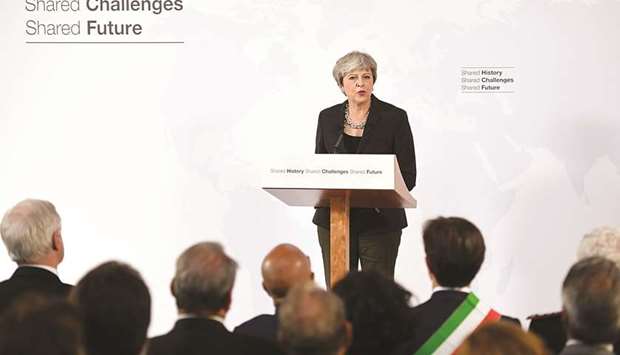But her proposals for such a transition, for meeting Britain’s financial obligations and for protecting EU citizens’ rights fell short of what the EU wanted.
EU Brexit negotiator Michel Barnier praised the speech for its “constructive spirit” but asked for more detail.
Another official said it had left him “even more concerned”.
In a speech at a 14th-century church in Florence, Italy, May appealed directly to EU leaders to unlock the talks, which have stalled over a series of issues, including the size of the bill Britain should pay as part of its divorce settlement.
She spent much of her 30-minute speech describing the similarities between Britain and the EU, saying that if the complicated talks to unravel more than 40 years of union should fail, the only beneficiaries would be those who oppose democracy, liberalism and free trade.
“Clearly people, businesses and public services should only have to plan for one set of changes in the relationship between the UK and the EU,” May told an audience of Italian business leaders and diplomats.
“So during the implementation period, access to one another’s markets should continue on current terms, and Britain also should continue to take part in existing security measures.”
Britain wants to move the talks forward and start addressing how a future relationship with the EU would work, a move May’s government says is vital if they want to find agreement on the divorce bill.
But the EU has stood firm, refusing to discuss trading arrangements until “sufficient progress” is made on the first three issues — the financial settlement, the land border with EU member Ireland and the protection of expatriates’ rights.
Beyond her vision for a transition, involving around two years of trading on the same terms, but no payments for access to the EU single market, May pledged to protect EU citizens’ rights in Britain after Brexit, saying that decisions by the European Court of Justice would be taken into account by British courts.
On the financial settlement, she also said Britain would “honour commitments we have made during the period of our membership”.
“I do not want our partners to fear that they will need to pay more or receive less over the remainder of the current budget plan as a result of our decision to leave,” she said.
May has long said Britain will honour its financial obligations, but she did not mention the 20bn euro figure reported in local media in the days running up to the speech.
She said little on Ireland, beyond noting that no one wanted a return to a “hard border” with British-ruled Northern Ireland that could reignite tensions on the island.

